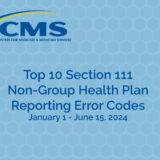CMS has issued its long-awaited final rule on enforcement of Civil Monetary Penalties regarding failing to register and accurately provide Mandatory Insurance Reporting on those payments that meet the $750 Section 111 reporting thresholds for payments for ongoing Workers’ Compensation (WC) and No Fault claims (Ongoing Responsibility for Medicals or ORM) as well as settlements, judgments, and awards from any primary plan such as any type of liability payment whether insured or self-insured, WC, or No Fault (Total Payment Obligation to Claimant or TPOC).
The CMS Alert on the topic can be viewed here. CMS’s description is that “CMS has finalized its rule specifying how and when CMS will calculate and impose civil money penalties (CMPs) when group health plan (GHP) and non-group health plan (NGHP) responsible reporting entities (RREs) fail to meet their Medicare Secondary Payer (MSP) reporting obligations. The text of the final rule can be found and reviewed in its entirety in the Federal Register, which can be found at https://www.federalregister.gov.“ The date of publication in the Federal Register will be October 11, 2023 (with an effective date of December 11, 2023) and will become applicable to primary plans and their RRE’s October 11, 2024. This document is able to be viewed online at, and on https://federalregister.gov/d/2023-22282 and on https://govinfo.gov.
On September 11, 2023, CMS declared this then proposed rule to not be economically significant (i.e. not adversely affect the economy in a material way) clearing the way for the rule’s promulgation.
Take Aways
Medivest has been expecting this rule for years. Most primary plan payers have Responsible Reporting Entities (RRE’s) in place and have established a method of collecting and transmitting the required Medicare Secondary Payer Act (MSP) data to CMS electronically as intended by the Mandatory Insurance Reporting section (most commonly referred to as Section 111) of the MSP’s MMSEA amendment. Those primary plan carriers and entities that have not established a formalized Section 111 reporting process should be making plans to comply now to avoid the long-awaited enforcement penalties. Additionally, as a result of the final rule coming to fruition after clearing the administrative economic impact process, claimants’ and plaintiffs’ attorneys may likely see more language added by the defense (primary plans) to hold the injured party responsible to provide and/or confirm correct data during the pendency of claims and certainly at the time of settlement of claims, and to timely respond for updates when requested from time to time, if the primary plan’s Section 111 report has been rejected by CMS due to identification data errors so the primary plan can correct same and avert any CMP. Parties should work with their MSP compliance partners and attorneys to make sure procedures are compliant with the MSP and not asking parties to go beyond the MSP or its regulatory rulemaking requirements.
For Additional Information
Medivest will continue to monitor changes occurring at CMS and will keep its readers up to date when such changes are announced. For questions, feel free to reach out to the Medivest representative in your area by clicking here or call us direct at 877.725.2467.







